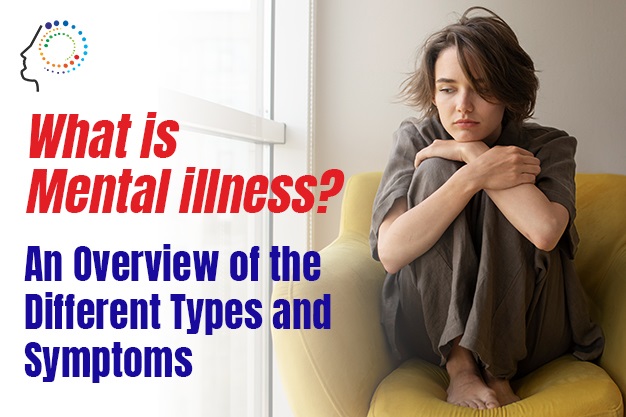Mental health issues have become a common occurrence as more people are suffering from some kind of mental illness that affects their life in some way. Several studies have also found that problems with mental health affect 1 out of every 4 individuals. The main reasons for this include a stressful environment, childhood trauma, emotional abuse, and sometimes genetic disorders.
Moreover, mental health conditions affect in different ways and show a wide range of symptoms. Hence, it is important that you know about the various types of mental illness and their symptoms to get appropriate treatment on time. Read on to find more about mental illness, their types, and symptoms.
What is Mental Illness?
Mental health problems have become quite common in this era. It affects a significant number of people due to their lifestyle, work environment, outside pressure, and similar reasons. However, when these problems become too regular to handle and affect the normal functioning of a person, it becomes a mental illness. Mental illness includes a variety of health conditions that affect the brain. It can subsequently cause mood changes, thinking problems, and behavioral issues.
Mental illness is also known as mental disability or mental health condition. They have typical characteristics such as disturbance in cognition and issues with emotional regulation. These are generally brought on when there is a glitch in brain functioning or some type of distress.
Also Read : What Are The 5 Signs of Mental Illness?
What are the Different Types of Mental Illness?
Different types of mental illnesses affect humans of all ages. Some of the common types of mental illness are as follows.
- Anxiety Disorder
Anxiety disorder is a mental disability in which a person may feel anxious or fearful without any real reason. The person may experience a rapid heartbeat, shortness of breath, and dizziness. Sometimes, the symptoms get too far that it causes significant impairment in the regular functioning of the person.
- Depression
A depressed person may feel terribly sad, irritated, isolated, hopeless, excessively guilty, and empty. They typically lose interest in the things that they used to like and indulge in. The symptoms of clinical depression generally last for more than two weeks without any improvement. The person may also show other signs, such as thoughts of dying, low energy, disrupted sleep, loss of appetite, and low self-worth.
- Post Traumatic Stress Disorder (PTSD)
PTSD is a type of mental disability that typically comes with intrusive memories of a traumatic event, avoiding situations or activities that caused the particular trauma, recurring nightmares of the event, and feeling extremely fearful of the threat. These symptoms may last for several weeks after the person has initially experienced them.
- Bipolar Disorder
People with bipolar disorder often experience alternating episodes of hypomania, mania, and major depression. When the person feels down, they lose pleasure in everyday activities and feel irritable and gloomy. However, they also have manic episodes where they are highly talkative and show impulsive, reckless behavior, distractibility, euphoria, and increased energy, among others.
- Eating Disorders
Eating disorders include anorexia nervosa and bulimia, in which the person has a heightened consciousness of their body weight and shape. They may show abnormal eating patterns and also overthink food. These can result in major distress, problems with normal functioning, and damage to general well-being.
Also Read : The Most Common Types of Mental Disorders
What are the Symptoms of Mental Illness?
Mental illness types vary depending on the symptoms they show. However, they usually affect the thoughts, emotions, and behavior of the affected person. In certain circumstances, the symptoms may include unwarranted physical pain or issues like stomach ache, headache, body pain in various parts, and similar issues. Some of the typical symptoms of mental disability can be as follows.
- Constant feelings of sadness.
- Inability to concentrate and often feeling confused.
- Feeling excessively worried or extremely fearful.
- Unnecessarily feeling excessively guilty.
- Signs of withdrawal from everyday life, including friends and family.
- Constant feelings of fatigue and low energy problems.
- Paranoia, hallucinations, delusions, and a general detachment from the present.
- Feeling extremely emotional even under slightly stressful situations.
- Inability to relate to other people and having difficulty understanding their situations.
- Taking up harmful habits like drugs and alcohol.
- Quick and major dietary changes.
- Feeling extremely angry, violent, or hostile in everyday situations.
- Issues with self-harm and thoughts of suicide.
Conclusion
Most mental illnesses are treatable when diagnosed at the right time. Making certain lifestyle changes can also benefit in preventing mental health conditions. It is essential to treat those who suffer from any type of mental issue with love and kindness.
In most cases, mental illness can be treated with medications, changes in the way of living, incorporating healthy habits, and therapy. Dr. Anil Yadav can render you the best treatment to ensure your mental well-being.




Recent Comments